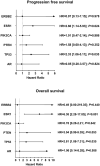Significant impact of circulating tumour DNA mutations on survival in metastatic breast cancer patients
- PMID: 33762647
- PMCID: PMC7990915
- DOI: 10.1038/s41598-021-86238-7
Significant impact of circulating tumour DNA mutations on survival in metastatic breast cancer patients
Abstract
Mutational analysis of circulating tumour (ct) DNA holds promise as an effective tool to predict the course of metastatic breast cancer (MBC). In the present study we used targeted next generation sequencing of ctDNA to evaluate the impact of cancer driven mutations on the prognosis of MBC. The study included 59 oestrogen receptor-positive (ER+), HER2-negative MBC patients. Sequencing analysis was performed in ESR1, PIK3CA, ERBB2, PTEN, TP53, KRAS, HRAS, NRAS, and AR. At baseline, patients started receiving either chemotherapy (34%; n = 20) or cyclin-dependent kinase 4/6 inhibitor therapy in combination with endocrine therapy (CDK4/6i+ET; 66%; n = 39). Overall, 64.4% (n = 38) of the patients carried at least one pathogenic or likely-pathogenic mutation. Number of ctDNA mutations was significantly linked with worse progression free survival (PFS; p = 0.003) and overall survival (OS; p = 0.007). Furthermore, ctDNA load, defined by the number of mutant ctDNA molecules per mL plasma, significantly correlated with PFS (p < 0.001) and OS (p = 0.001). Furthermore, mutational status of ESR1 and TP53 significantly predicted PFS (p = 0.024 and p = 0.035, respectively) and OS (p < 0.001 and p = 0.035, respectively). These results emphasizes the clinical value of ctDNA mutational analysis in the management of advanced breast cancer.
Conflict of interest statement
The authors declare no competing interests.
Figures



References
Publication types
MeSH terms
Substances
LinkOut - more resources
Full Text Sources
Other Literature Sources
Medical
Research Materials
Miscellaneous

